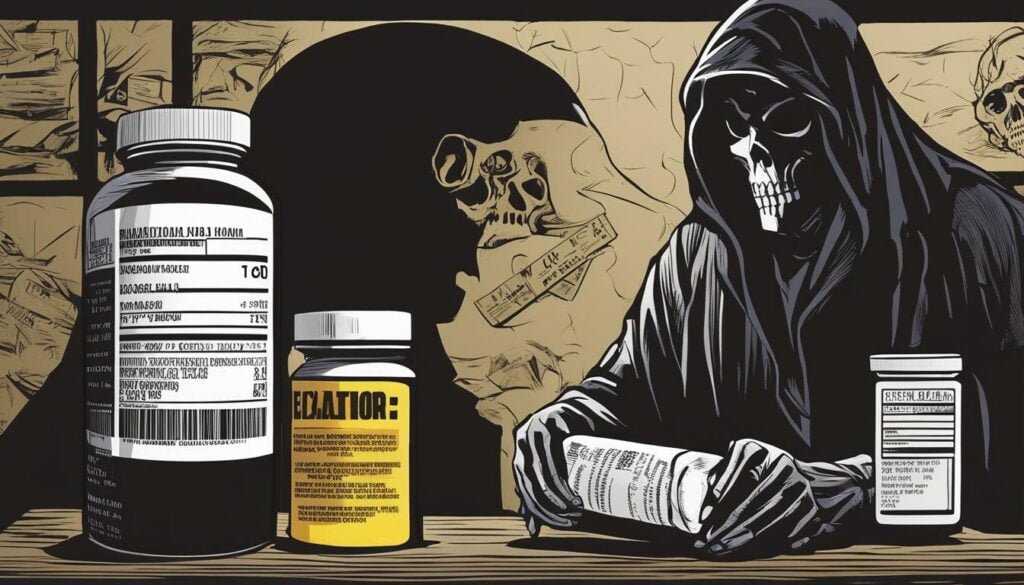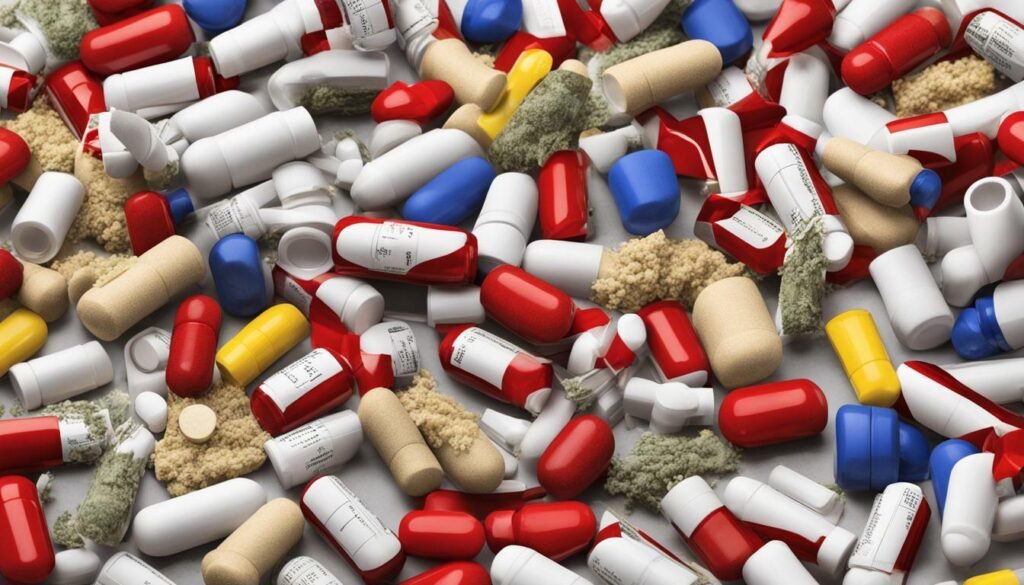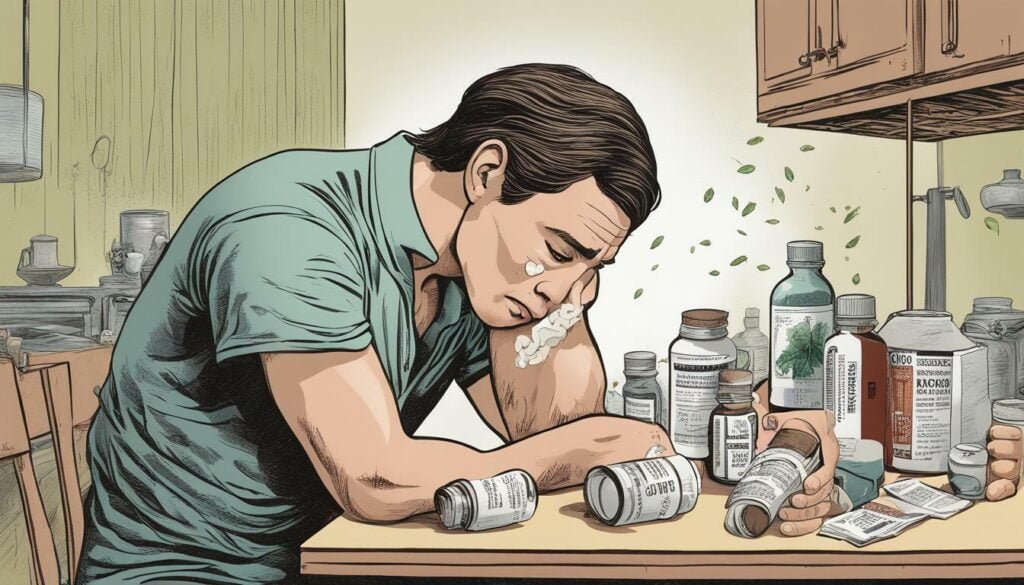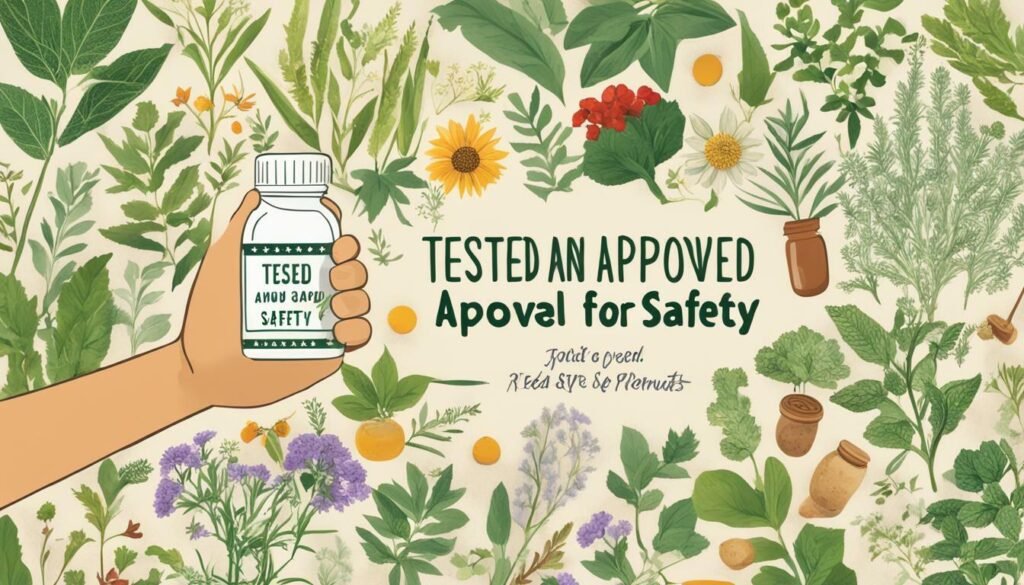As consumers become increasingly interested in natural health remedies, the use of herbal supplements has grown significantly. However, the lack of regulation in the herbal supplement industry raises concerns about product safety. Without proper oversight, consumers may unknowingly put themselves at risk by using unregulated herbal products.
Herbal supplement risks include variations in product quality, standardized dosages, and potential contamination with harmful substances. Additionally, the lack of standardized regulations means that the safety and efficacy of these products are not always guaranteed. It is crucial to understand the potential dangers of unregulated herbal supplements to make informed decisions about product use.
Key Takeaways
- The herbal supplement industry is largely unregulated, raising concerns about product safety.
- Potential dangers of unregulated herbal supplements include variations in product quality, standardized dosages, and potential contamination with harmful substances.
- Understanding the risks associated with unregulated herbal supplements is essential for making informed decisions about product use.
The Need for Regulation in the Herbal Supplement Industry
Unregulated supplements pose significant health risks to consumers. Without proper oversight, manufacturers can introduce potentially harmful substances or contaminants into their products, risking the health and well-being of those who use them. Furthermore, unregulated supplements may not contain the active ingredients advertised on their labels, which can lead to ineffective treatment of illnesses and other health concerns.
Given these risks, it’s clear that the herbal supplement industry needs regulatory oversight to ensure that products are safe and effective. While some manufacturers may argue that increased regulation stifles innovation, the health and safety of consumers need to be the primary concern. By establishing clear guidelines and standards for manufacturing, labeling, and testing, regulatory agencies can help safeguard the public from unscrupulous manufacturers and ensure that they receive the quality and efficacy they expect from herbal supplements.
Unfortunately, the lack of regulation for herbal supplements means that consumers often cannot distinguish safe, high-quality products from low-quality or dangerous alternatives. It is up to regulatory agencies to set and enforce standards for manufacturing, labeling, and testing to help ensure that consumers have the information they need to make informed decisions about the supplements they purchase.
Overall, increased regulation in the herbal supplement industry is necessary to protect public health and safety. As consumers continue to search for natural remedies and alternatives to traditional medicine, it is important to establish trust in the supplements they purchase. Increased regulation can provide the necessary framework to ensure that consumers have access to safe and effective products that help to improve their health and well-being.

Common Dangers of Unregulated Herbal Supplements
When it comes to unregulated herbal supplements, the potential dangers cannot be ignored. These products are not subject to the same standards as prescription drugs, and as a result, consumers may be unaware of the risks associated with their use. Some of the common dangers of unregulated herbal supplements include:
- Potential Contamination: Unlike regulated drugs, unregulated supplements aren’t required to undergo testing for contaminants. This means that there’s a risk of exposure to harmful substances like heavy metals, pesticides, and bacteria.
- Lack of Standardized Dosages: Without regulation, there’s no guarantee of consistent active ingredient concentrations across different products. This can lead to overdoses, underdoses, or ineffective treatments.
- Risk of Adverse Interactions: Unregulated supplements may contain ingredients that interact with prescription medications in unexpected ways. This can lead to a variety of adverse health effects, including organ damage or even death.
It’s important to note that these are just a few of the potential dangers associated with unapproved herbal supplements. Consumers should always exercise caution when considering the use of these products and seek guidance from healthcare professionals.

Lack of Manufacturing Standards and Quality Control
One of the major concerns with unregulated herbal products is the lack of manufacturing standards and quality control. Unlike regulated herbal supplements, which must adhere to strict manufacturing standards and undergo rigorous quality testing, unregulated products are not subject to any such requirements. This means that there is no guarantee of product safety or efficacy, and consumers may be putting their health at risk by using these products.
Without standardized manufacturing processes, there may be significant variations in product quality and potency. This can lead to unpredictable and potentially harmful effects on users. Furthermore, the lack of quality control measures means that unregulated herbal products may be contaminated with harmful substances, such as heavy metals, pesticides, or other toxins.

Ultimately, the absence of manufacturing standards and quality control measures for unregulated herbal supplements raises serious concerns about safety and efficacy. Consumers should be aware of these risks and take precautions to ensure that the products they use are safe and effective.
Case Studies on Safety Issues with Unregulated Herbal Supplements
Unfortunately, there have been numerous cases where individuals have experienced adverse effects or harm due to the use of unregulated herbal supplements. These incidents highlight the potential dangers associated with these products and the need for increased regulation. Below are a few examples:
-
Case 1: In 2015, a 53-year-old woman experienced liver failure and required a liver transplant after taking a green tea extract supplement. The supplement contained high levels of a compound called epigallocatechin gallate (EGCG), which can cause liver damage in some individuals.

-
Case 2: In 2017, a 34-year-old man suffered cardiac arrest and died after consuming a kratom product purchased from an online vendor. The kratom was found to be contaminated with salmonella and other harmful bacteria.

-
Case 3: In 2019, a 47-year-old man developed acute liver injury after using a weight loss supplement containing Garcinia cambogia, a popular ingredient in many herbal supplements marketed for weight loss. The supplement was found to be adulterated with undisclosed ingredients.

These cases are just a few examples of the potential dangers associated with unregulated herbal supplements. It is essential for consumers to be informed and cautious when considering the use of these products.
Herbal Supplement Regulations in the United States
Herbal supplements are regulated as dietary supplements under the Dietary Supplement Health and Education Act (DSHEA) of 1994. The Food and Drug Administration (FDA) has the authority to regulate these products, but unlike prescription drugs, herbal supplements do not require FDA approval before they are marketed to the public.
Under DSHEA, herbal supplements are considered safe until proven otherwise. Manufacturers are responsible for ensuring the safety of their products and are required to include a disclaimer on their labels stating that their product has not been evaluated by the FDA, and that it is not intended to diagnose, treat, cure, or prevent any disease. They are also required to follow good manufacturing practices (GMPs) to ensure the quality and purity of their products.
The FDA regulates herbal supplements as food rather than drugs, which means that they are subject to a lower level of scrutiny than prescription medications. However, the agency can take action if a product is found to be unsafe or mislabeled. The FDA can also issue warning letters or seize products that are deemed to be in violation of the law.
In addition to the FDA, other government agencies also regulate herbal supplements. The Federal Trade Commission (FTC) is responsible for regulating the marketing of these products and ensuring that manufacturers do not make false or misleading claims. The United States Department of Agriculture (USDA) regulates herbal supplements that contain plant materials and is responsible for ensuring that they are free from contaminants.

Despite the regulations in place, there are still concerns about the safety and efficacy of herbal supplements. The lack of pre-market review and inconsistent manufacturing standards make it difficult to ensure the safety and quality of these products. It is important for consumers to be aware of the potential risks associated with unregulated herbal supplements and to choose products that are manufactured by reputable companies and comply with industry safety standards.
Ensuring Herbal Supplement Safety
At this point, it is clear that unregulated herbal supplements pose potential risks to consumer health. However, there are steps that individuals can take to ensure the safety of the herbal supplements they choose to use.
First and foremost, it is important to select reputable brands and manufacturers. Look for products that have been independently tested and certified by a third-party organization, such as the US Pharmacopeia or NSF International.
It is also crucial to read labels carefully and thoroughly. Look for supplements that list all of their ingredients and dosage amounts, and avoid any products with vague or incomplete labeling.
Consulting with a healthcare professional before beginning any herbal supplement regimen is highly recommended. They can provide guidance on potential interactions with medications, appropriate dosages, and any other concerns specific to an individual’s health needs.
Furthermore, staying informed about the latest herbal supplement regulations and safety guidelines is essential. The US Food and Drug Administration (FDA) regulates herbal supplements under the Dietary Supplement Health and Education Act (DSHEA). This law requires manufacturers to ensure that their products are safe, properly labeled, and do not make false or misleading claims.
By taking these precautions and staying vigilant about the safety of herbal supplements, consumers can make informed decisions that promote optimal health and well-being.

Alternatives to Unregulated Herbal Supplements
While unregulated herbal supplements may seem like an appealing option for those seeking natural health remedies, the potential risks associated with their use cannot be ignored. Fortunately, there are a variety of alternatives available that offer a higher level of safety and efficacy.
Whole Foods: One option is to incorporate whole foods into your diet that have been shown to offer health benefits. Examples include turmeric for reducing inflammation, garlic for reducing cholesterol, and ginger for improving digestion.
Traditional Therapies: Many traditional healing practices, such as acupuncture, massage therapy, and aromatherapy, can provide natural and effective relief from a variety of health issues.
| Regulated Herbal Products: | Another alternative is to choose regulated herbal products that have undergone safety testing and adhere to manufacturing standards. Look for products that have been certified by reputable organizations such as the United States Pharmacopeia (USP) or the National Products Association (NPA). |
|---|
Consult Your Healthcare Provider: It’s always a good idea to consult with a healthcare professional before starting any new health regimen, especially if you have a pre-existing medical condition or are taking medications. Your provider can help you make informed decisions about the best options for your individual needs.

By choosing these alternatives to unregulated herbal supplements, you can take proactive steps towards protecting your health and well-being. Remember, when it comes to natural health remedies, informed choices are the safest choices.
Educating Consumers on Herbal Supplement Risks
As we have seen, unregulated herbal supplements can pose significant risks to consumer health and safety. These risks include the lack of standardized dosages, potential contamination with harmful substances, and the risk of adverse interactions with medications. It is crucial that consumers understand the potential dangers of these products and take steps to ensure their safety.
To begin with, consumers should be aware that not all herbal supplements are created equal. Just because a product is labeled “natural” or “herbal” does not necessarily mean it is safe. It is important to read labels and research brands before purchasing any herbal supplement. Look for products that have been certified by independent third-party organizations such as the US Pharmacopeia or NSF International.
It is also recommended to consult with a healthcare professional before starting any new supplement regimen, especially if you are currently taking medications or have pre-existing health conditions. They can advise you on the potential risks and benefits of a particular product and help you make an informed decision.
Another way to ensure the safety of herbal supplements is to be wary of exaggerated or unsubstantiated health claims. Supplements marketed as “miracle cures” or with claims that seem too good to be true should be viewed with caution. Remember that the FDA does not regulate herbal supplements in the same way that it does prescription medications, so it is up to consumers to be vigilant.
Finally, consumers should educate themselves on the potential dangers of unregulated herbal supplements and seek reliable sources of information. The National Center for Complementary and Integrative Health and the American Botanical Council are excellent resources for research on herbal supplements, their potential benefits, and risks. By staying informed and being cautious, consumers can make safe and informed choices when it comes to using herbal supplements.

In conclusion, understanding the potential dangers of unregulated herbal supplements and taking steps to ensure their safety is crucial for consumer health and well-being. By researching products, consulting healthcare professionals, and seeking reliable sources of information, consumers can make well-informed choices when it comes to using herbal supplements.
Conclusion
After exploring the potential dangers of unregulated herbal supplements and the need for regulatory oversight, it is clear that consumers must exercise caution when choosing natural health remedies. The lack of standardized dosages, potential contamination with harmful substances, and the risk of adverse interactions with medications are serious concerns that cannot be ignored.
Fortunately, there are steps that consumers can take to ensure the safety of herbal supplements they choose to use. By selecting reputable brands, reading labels, and consulting healthcare professionals for advice, individuals can make informed choices that support their health and well-being.
It is also important to consider alternatives to unregulated herbal supplements, such as whole foods, traditional therapies, and regulated herbal products that offer a higher level of safety and quality assurance. By educating ourselves and others on the potential risks associated with unregulated herbal supplements, we can make informed choices and prioritize our health and safety.
FAQ
Q: What are herbal supplement risks?
A: Herbal supplement risks refer to the potential dangers associated with the use of unregulated herbal supplements. These risks can include adverse reactions, contamination with harmful substances, and interactions with medications.
Q: Why is regulation necessary in the herbal supplement industry?
A: Regulation is necessary in the herbal supplement industry to ensure consumer safety. Unregulated supplements can pose health risks due to the lack of standardized dosages, potential contamination, and the absence of manufacturing standards and quality control measures.
Q: What are the common dangers of unregulated herbal supplements?
A: Common dangers of unregulated herbal supplements include variations in product quality and potency, the risk of contamination with harmful substances, and the potential for adverse interactions with medications.
Q: How do unregulated herbal supplements lack manufacturing standards and quality control?
A: Unregulated herbal supplements lack manufacturing standards and quality control measures, which can lead to variations in product quality and potency. This raises concerns about safety and efficacy.
Q: Can you provide case studies on safety issues with unregulated herbal supplements?
A: Yes, there have been documented cases where consumers have experienced adverse effects or harm due to the use of unregulated herbal supplements. These incidents highlight the potential risks associated with these products.
Q: What are the current herbal supplement regulations in the United States?
A: In the United States, herbal supplements are regulated by the Food and Drug Administration (FDA) under the Dietary Supplement Health and Education Act of 1994 (DSHEA). The FDA oversees the safety and labeling of these products.
Q: How can consumers ensure the safety of herbal supplements?
A: Consumers can ensure the safety of herbal supplements by selecting reputable brands, reading labels carefully, and consulting healthcare professionals for advice. It is important to be informed and make educated choices.
Q: What are some alternatives to unregulated herbal supplements?
A: For individuals seeking natural health remedies, alternatives to unregulated herbal supplements include whole foods, traditional therapies, and regulated herbal products that offer a higher level of safety and quality assurance.
Q: Why is it important to educate consumers on herbal supplement risks?
A: It is important to educate consumers on herbal supplement risks to increase awareness and promote informed decision-making. Reliable information sources and caution are necessary when considering the use of these products.

